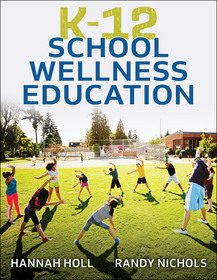
K–12 School Wellness Education
- Publisher's listprice GBP 65.00
-
31 053 Ft (29 575 Ft + 5% VAT)
The price is estimated because at the time of ordering we do not know what conversion rates will apply to HUF / product currency when the book arrives. In case HUF is weaker, the price increases slightly, in case HUF is stronger, the price goes lower slightly.
- Discount 10% (cc. 3 105 Ft off)
- Discounted price 27 948 Ft (26 618 Ft + 5% VAT)
Subcribe now and take benefit of a favourable price.
Subscribe
31 053 Ft

Availability
Estimated delivery time: In stock at the publisher, but not at Prospero's office. Delivery time approx. 3-5 weeks.
Not in stock at Prospero.
Why don't you give exact delivery time?
Delivery time is estimated on our previous experiences. We give estimations only, because we order from outside Hungary, and the delivery time mainly depends on how quickly the publisher supplies the book. Faster or slower deliveries both happen, but we do our best to supply as quickly as possible.
Product details:
- Publisher MG – Human Kinetics
- Date of Publication 30 September 2025
- Number of Volumes Trade Paperback
- ISBN 9781718218406
- Binding Paperback
- No. of pages240 pages
- Size 278x216x18 mm
- Weight 698 g
- Language English 700
Categories
Short description:
Educators learn to integrate physical activity with wellness by blending nutrition, emotional health, fitness, and injury prevention via an innovative model. Aligned with national standards and featuring practical tools and success stories, it transforms schools into hubs of holistic well-being.
MoreLong description:
Health education and physical education teachers are the champions of wellness in schools, but often health and physical activity are taught separately in the K-12 environment. The School Wellness Education (SWE) model is a unique approach that teaches students why physical activity benefits their well-being to holistically influence students toward healthy lifestyles. K-12 School Wellness Education prepares future physical education teachers with strategies to use a whole school approach to promote health, wellness, and fitness.
Authors Hannah Holl and Randy Nichols, the educators who developed the SWE model, have based K-12 School Wellness Education on the Whole School, Whole Community, Whole Child (WSCC) model and aligned the content with SHAPE America’s most recent National Physical Education Standards.
The text incorporates traditional areas of games, sports, and fitness performance and, more importantly, focuses on why physical activity matters. Units are not based on games or fitness activities but are instead focused on the National Physical Education Standards and the five components of Living Well: nutrition, social and emotional wellness, the human body and responses to physical activity, health-related fitness, and injury prevention and safety.
The Living Well focus helps elementary, middle school, and high school students progress along their physical literacy journey and health literacy journey. It demonstrates for students how a physically active lifestyle is associated with wellness, disease prevention, and an overall improved quality of life.
K-12 School Wellness Education offers physical education teacher education (PETE) students and in-service teachers the following:
- Information on how SWE (and its related evidence-based research) differs from other models
- Curriculum development tools such as templates for unit plans, unit storyboards, and lesson plans
- K-12 grade-level benchmarks to measure student progress on their physical and health literacy journeys
- Over 30 success stories and leadership examples to guide strategies for collaboration, garner administrative support, and create a culture of wellness in schools
- Special features such as learning objectives, key term lists, sidebars, and chapter wrap-up sections to support reader comprehension










